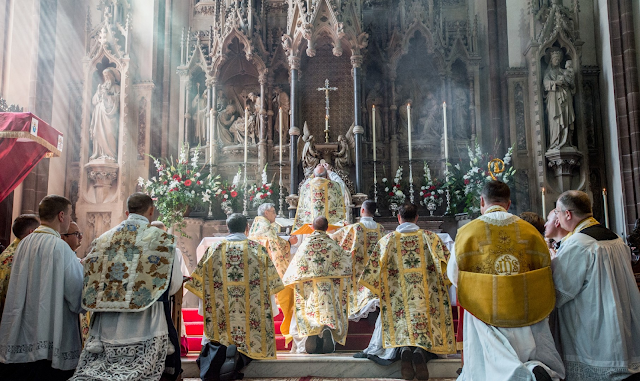Pope falls victim to rigid, soul-destroying anticlericalism. While others worships the Lord in the beauty of holiness, he is content with the ugliness of modernism.
This afternoon, during the 18th General Congregation of the 16th Ordinary General Assembly of the Synod of Bishops, the Holy Father Francis delivered a speech, the text of which we publish below:
Intervention of the Holy Father
I like to think of the Church as a faithful people of God, saint and sinner, a people summoned and called with the force of the beatitudes and of Matthew 25.
Jesus, for his Church, did not assume any of the political schemes of his time: neither Pharisees, nor Sadducees, nor Essenes, nor Zealots. No “closed corporation”; It simply takes up the tradition of Israel: “you will be my people and I will be your God.”
I like to think of the Church as this simple and humble people who walk in the presence of the Lord (the faithful people of God). This is the religious sense of our faithful people. And I say faithful people so as not to fall into the many ideological approaches and schemes with which the reality of the people of God is “reduced.” Simply faithful people, or also, “holy faithful people of God” on the way, holy and sinful. And the Church is this.
One of the characteristics of this faithful people is their infallibility; yes, she is infallible in credendo. (In credendo falli nequit, says LG 9) Infallibilitas in credendo. And I explain it like this: “when you want to know what Holy Mother Church believes, go to the Magisterium, because he is in charge of teaching it to you, but when you want to know how the Church believes, go to the faithful people.
An image comes to mind: the faithful people gathered at the entrance to the Cathedral of Ephesus. History (or legend) says that people were on both sides of the road to the Cathedral while the Bishops in procession made their entrance, and that in chorus they repeated: "Mother of God", asking the Hierarchy to declare that truth dogma. that they already possessed as the people of God. (Some say that they had sticks in their hands and showed them to the Bishops). I don't know if it's history or legend, but the image is valid.
The faithful people, the faithful holy people of God, have a soul, and because we can speak of the soul of a people we can speak of a hermeneutics, of a way of seeing reality, of a conscience. Our faithful people are aware of their dignity, they baptize their children, they bury their dead.
The members of the Hierarchy come from that people and we have received the faith of that people, generally from our mothers and grandmothers, “your mother and your grandmother” Paul tells Timothy, a faith transmitted in feminine dialect, like the Mother of the Maccabees who spoke “in dialect” to his children. And here I like to emphasize that, in the faithful holy people of God, faith is transmitted in dialect, and generally in feminine dialect. This is not only because the Church is Mother and it is precisely women who best reflect it; (the Church is a woman) but because it is women who know how to wait, how to discover the resources of the Church, of the faithful people, they take risks beyond the limit, perhaps with fear but courage, and in the dawn of the new day they approach a tomb with the intuition (not yet hope) that there may be some life.
The woman of the holy faithful people of God is a reflection of the Church. The Church is feminine, she is a wife, she is a mother.
When Ministers exceed their service and mistreat the people of God, they disfigure the face of the Church with sexist and dictatorial attitudes (just remember the intervention of Sister Liliana Franco). It is painful to find in some parish offices the “price list” of sacramental services in supermarket style. Either the Church is the faithful people of God on the way, saint and sinner, or it ends up being a company of varied services. And when pastoral agents take this second path, the Church becomes the supermarket of salvation and the priests mere employees of a multinational. It is the great defeat to which clericalism leads us. And this with a lot of shame and scandal (it is enough to go to ecclesiastical tailor shops in Rome to see the scandal of young priests trying on cassocks and hats or albs and roquettes with lace).
Clericalism is a whip, it is a scourge, it is a form of worldliness that dirties and damages the face of the Lord's wife; enslaves God's faithful holy people.
And the people of God, the faithful holy people of God, continue forward with patience and humility, enduring the contempt, mistreatment, and marginalization on the part of institutionalized clericalism. And how naturally we speak of the princes of the Church, or of episcopal promotions as career advancements! The horrors of the world, the worldliness that mistreats the holy faithful people of God.
Cathcon: This is such an unhealthy obsession which dwells in the psychology of the Pope. The anticlerical rhetoric is taken directly from and is of a piece with 19th century atheistic socialism. Diderot notoriously said "Man will never be free until the last king is strangled with the entrails of the last priest." One wonders just how deep the hatred of himself for being trapped in the priesthood and the priesthood itself is in the Papal heart.
Indeed Pope Francis is on record, the sexualisation of society post-68 infecting the priesthood is not the problem but clericalism is. He is deliberately trying to distract attention from the reality of sin by the wicked and he knows it. https://t.co/0AFYo8yzTU
— Catholic Conclave (@cathconclave) October 25, 2023










.jpeg)

Comments